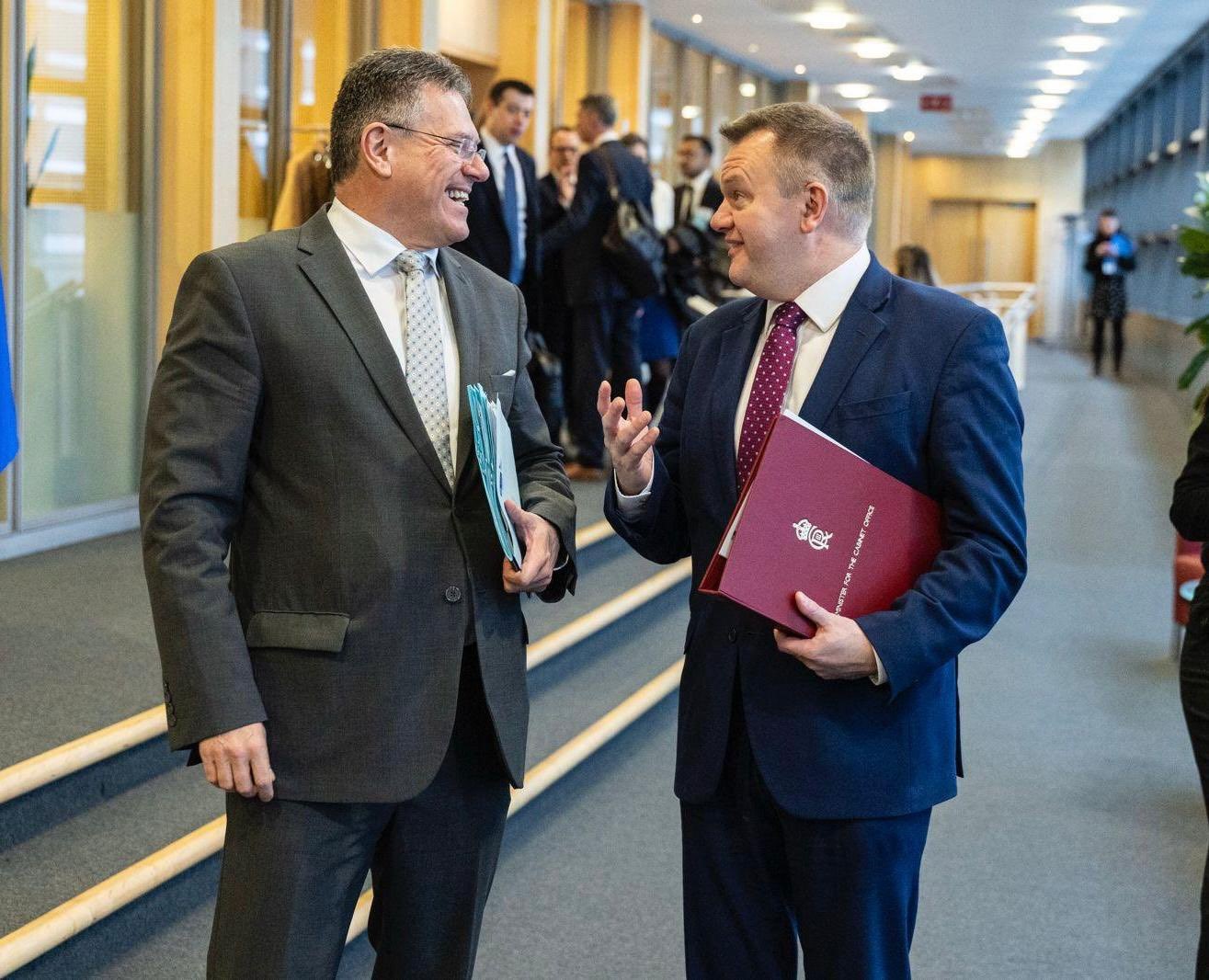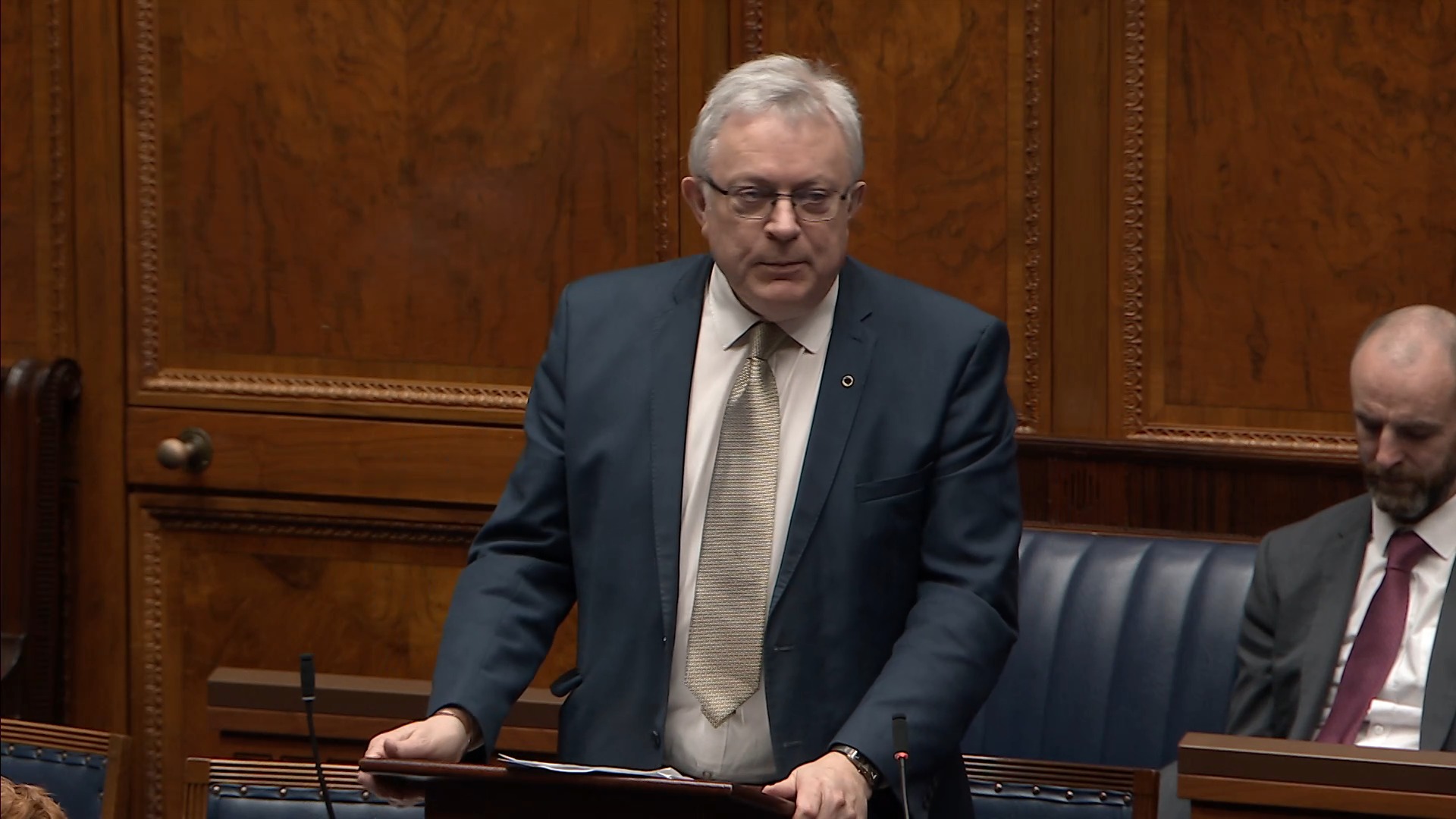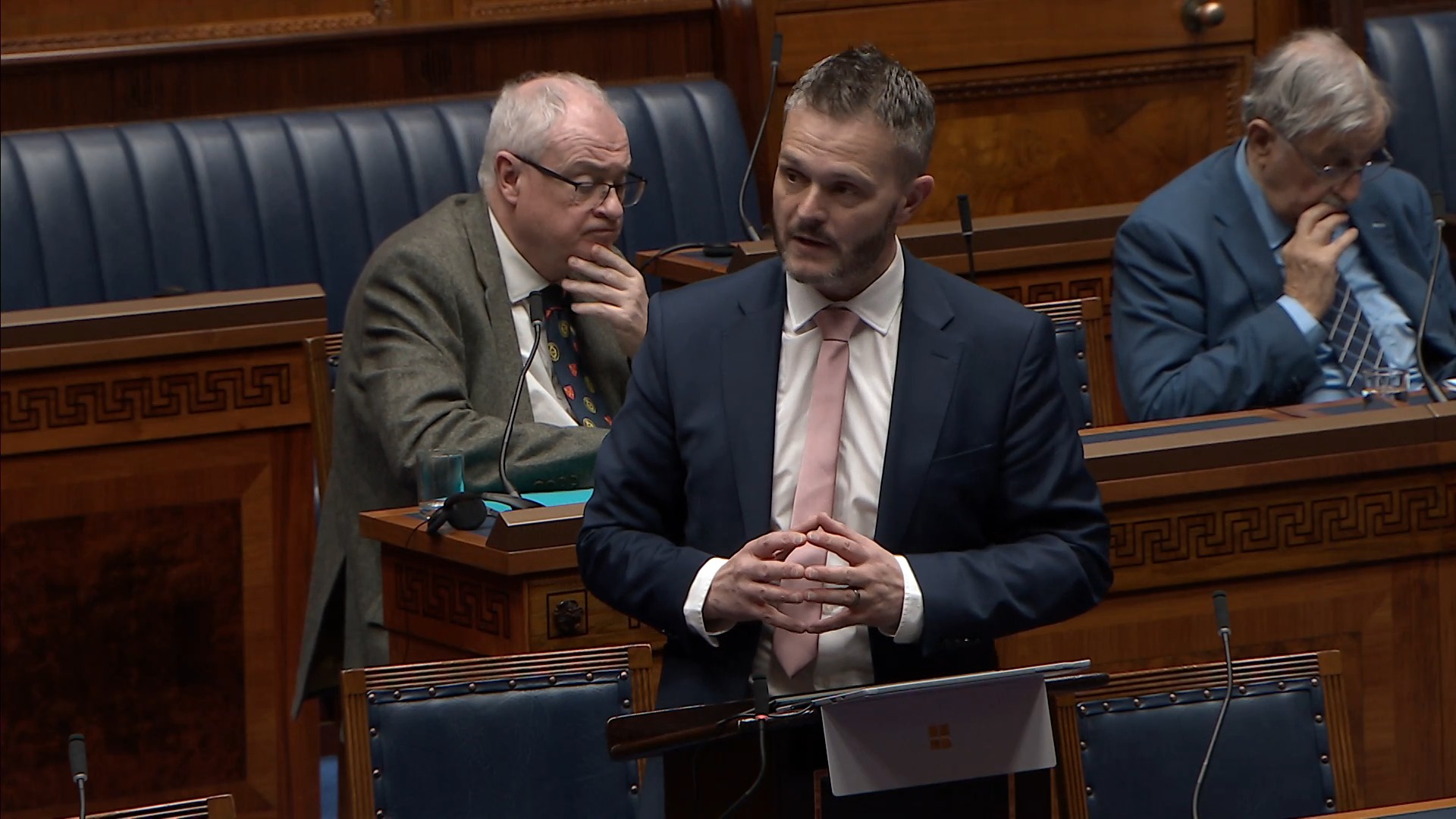Brexit & Beyond newsletter
10 February 2025
Welcome to the 10 February 2025 Brexit & Beyond newsletter
Last week, the Prime Minister Sir Keir Starmer and the Minister for European Union Relations Nick Thomas-Symonds travelled to Brussels for separate engagements. The former attended an informal retreat with the 27 EU leaders and Presidents von der Leyen and Costa as part of the "reset" between the UK and the European Union.
The Assembly debated an Official Opposition (SDLP) motion “Towards a Shared Island”.
The Assembly annulled the Direct Payments to Farmers (Cross-Compliance) (Amendment) Regulations (Northern Ireland) 2024.
At Westminster, the House of Lords European Affairs Committee continued its inquiry into the UK-EU reset.
- UK-EU relations
- Brexit and Food retailers
- Windsor Framework Democratic Scrutiny Committee
- UK Government trade relations in Parliament
- The UK-EU reset
- European Commission work programme for 2025
- Towards a Shared Island
- Direct Payments to Farmers (Cross-Compliance) (Amendment) Regulations (Northern Ireland) 2024
- Assessing the Economic Impact of UK-EU Alignment within Brexit Red Lines
- Other news
UK-EU relations
Last Monday, the Prime Minister met Nato Secretary General Mark Rutte in Brussels. They held a joint briefing, where they spoke about defence spending and establishing an "ambitious" UK-EU partnership. The Prime Minister’s remarks can be read here.
The Prime Minister then attended an informal retreat with the 27 EU leaders and Presidents von der Leyen and Costa as part of the "reset" between the UK and the European Union. It was reported that over a dinner of celeriac soup and sea bream, Starmer told European leaders he wanted deeper EU-UK cooperation against state threats and sabotage.
Speaking in the House of Commons on Thursday, Nick Thomas-Symonds, Minister for European Union Relations said:
“This marked a clear step forward for this Government’s reset of the UK’s relationship with the EU. He is the first British Prime Minister to join a meeting of European Council members since the UK left the EU. The Prime Minister discussed the common threats that the UK and the EU face, and the value that closer UK-EU co-operation on security and defence could bring.”
The Guardian later reported that António Costa, European Council President has said that the EU will not let the question of fishing rights derail a pact with the UK on security and defence. He was quoted as saying:
“What is important now is to take note of the wish of the United Kingdom to reset their relations with the European Union and our wish to have the closest relation as possible with the United Kingdom, namely on security and defence.”
On Tuesday, the UK Government announced it will welcome the Presidents of the European Council and the European Commission to the UK for the first UK-EU leaders’ summit, which will take place on Monday 19 May.
That evening, the Prime Minister hosted the Danish Prime Minister, Mette Frederiksen, at Downing Street. The leaders reflected on the EU Council dinner, and the Prime Minister said he was pleased to have been able to set out his vision for a closer UK and EU relationship that would benefit all sides through greater growth and enhanced defence and security cooperation.
The Minister for European Union Relations attended the UK-EU forum in Brussels on Tuesday to discuss the shared challenges and opportunities facing the UK and the EU, opposite his EU counterpart, Maroš Šefčovič. In his speech he noted “that at a time of such intense global change, the UK and the EU have many mutually aligned interests and challenges.”
 European trade commissioner Maroš Šefčovič and Nick Thomas-Symonds MP, Minister for European Union Relations, in Brussels last Tuesday
European trade commissioner Maroš Šefčovič and Nick Thomas-Symonds MP, Minister for European Union Relations, in Brussels last Tuesday
Reflecting on this in the House of Commons on Thursday, Minister Thomas-Symonds said: “I attended the UK-EU forum in Brussels to discuss the shared challenges and opportunities facing the UK and the EU, opposite my EU counterpart, Maroš Šefčovič. I made the case that this Government will be guided by what I am calling “ruthless pragmatism” —working in the UK’s national interest to make people across the UK safer, more secure and more prosperous. The Government’s position is that it is in the British national interest to improve our economic, safety and security relationships with our nearest neighbours. We reject the ideological approach of the past and will take a hard-headed assessment of the British national interest.”
Last week the Telegraph published an article by Nick Thomas-Symonds MP, the Minister for European Union Relations, on in which he wrote: “For this Government, our reset with the EU means the UK being safer, more secure and increasingly prosperous. It does not mean hitting rewind. We are not undoing Brexit. There is no opacity over the outcome of the referendum in 2016. Yet, five years on, we can see some of the negative impacts of the current deal emerging here at home, as well as in Europe.”
Brexit and Food retailers
Writing in The Telegraph, Alex Freudmann, Marks and Spencer’s (M&S) Managing Director of Food, has slammed “the sloth-like speed with which food crosses the Irish Sea,” saying it’s hurting customers, suppliers, and the food industry’s competitiveness. He argues that “Brexit bureaucracy continues to add complexity and cost for retailers, and limits choice and value for customers”—a particular headache for fresh products with short shelf lives.
On the Windsor Framework, Freudmann acknowledges that while it has eased movement to Northern Ireland, it has come with “huge cost and complexity.” He also calls out the “ridiculousness” of requiring labels stating ‘Not for EU’ on EU-standard products like French Brie and Italian Parmesan. M&S is now urging the UK Government to work with the EU to prevent this requirement from being rolled out across Great Britain.
It is worth noting that in September 2024, the UK Government announced it will not proceed with the introduction of ‘not for EU’ labelling on a mandatory basis in Great Britain.
Windsor Framework Democratic Scrutiny Committee
Last week, Ciara Ferguson MLA (Sinn Féin) replaced Philip McGuigan MLA (Sinn Féin) as Chairperson of the Windsor Framework Democratic Scrutiny Committee. Philip McGuigan MLA is now Chair of the Assembly’s Health Committee.
 Sinn Féin’s Ciara Ferguson MLA is the new Chairperson of the Windsor Framework Democratic Scrutiny Committee
Sinn Féin’s Ciara Ferguson MLA is the new Chairperson of the Windsor Framework Democratic Scrutiny Committee
One of Ciara Ferguson’s first engagements as Chairperson, along with the Committee’s deputy Chairperson David Brooks MLA (DUP), was to meet Lord Carlile, Chair of the House of Lords Northern Ireland Scrutiny Committee.
UK Government trade relations in Parliament
Last week, Conservative MP John Cooper led a Westminster Hall debate in the House of Commons on the UK-US bilateral relationship. The Minister of State, Foreign, Commonwealth and Development Office (Stephen Doughty MP) reflected that “A lot of comments … rightly focused on the strength of our economic and trading partnership, which is a crucial pillar of our relationship. Strengthening that partnership with the US is a core component of the Government’s growth mission.” He continued to say that the UK Government “will continue to seize opportunities to boost trade with the US in a way that promotes growth, creates jobs and aligns with the UK’s national interests.”
On Tuesday, Lord Livermore, the Financial Secretary to the Treasury, told the House of Lords about the 2025 UK-China Economic and Financial Dialogue - the first since 2019. He said, “The Chancellor was joined by the Governor of the Bank of England, the chief executive of the Financial Conduct Authority, and representatives from Britain’s financial services firms. The dialogue unlocked agreements worth £600 million over the next five years, and secured new agreements on vaccine approvals, fertiliser, whisky labelling, legal services, automotives, and accountancy. In financial services, co-operation was agreed in areas such as capital markets, pensions and sustainable finance. The Chancellor also raised areas of concern to the UK, including trade imbalances, economic security, Russia’s illegal war in Ukraine, and human rights.”
The UK-EU reset
On Tuesday, the House of Lords European Affairs Committee continued its inquiry into the UK-EU reset and took evidence from the following former Government officials:
- Anton Spisak, Associate Fellow at Centre for European Reform, and former official at Cabinet Office and FCDO
- Philip Rycroft CB, former Permanent Secretary at Department for Exiting the EU (DExEU)
- Shanker Singham, Chairman and CEO at Competere Ltd, and former advisor at Department of International Trade
In the context of global challenges, Philip Rycroft stressed the importance of the EU-UK Relationship for trade and also for addressing shared challenges like defence and security. He observed, “the notion of a reset can be slightly misleading, in that it implies that we will go from state A to state B and that is it. In fact, this relationship has always been, and will always be, a relationship that evolves and changes over time.”
Shanker Singham suggested the UK’s economic relationship with the EU should be considered within the broader context of its global trade partnerships. He submitted key priorities for the Government include maintaining an independent trade policy and preserving domestic regulatory autonomy to drive economic growth. Within these constraints, he suggested the UK should seek the best possible trading relationship with the EU, particularly by improving the Trade and Cooperation Agreement (TCA) in areas such as services and mutual recognition of goods. Additionally, he advanced the UK can take unilateral steps to enhance import flows, recognizing the importance of imports to exports. Improvements in border controls and engagement with EU initiatives like customs reform and the "Trust and Check" scheme could further strengthen economic ties.
European Commission work programme for 2025
Last Wednesday, Euractiv published a draft list of all the initiatives in the European Commission Work Programme (CWP) for 2025. The final version of the CWP will be presented on 11 February. It will be the first programme published since the European Parliament elections last June and the return of the Northern Ireland Assembly in February 2024.
On Thursday, the Assembly’s Research Service (RaISe) posted an article, ‘European Commission Work Programme 2025: Enhanced engagement with Northern Ireland stakeholders’ on its Research Matters blog.
Towards a Shared Island
Last Monday, the Assembly debated an Official Opposition (SDLP) motion “Towards a Shared Island”.
Opening the debate, Patsy McGlone MLA (SDLP) said “We have outlined in the motion our many issues and proposals on positive cross-border cooperation and the benefits that can accrue from it. … It is very important that we make the case for such cooperation, and it makes sense for economic integration. Many companies on this island, particularly in the agri-food and agriculture sectors and others, are already doing that. That emphasises the benefits of cross-border cooperation and shared economic planning.
 Patsy McGlone MLA (SDLP) speaking in the Chamber on Monday
Patsy McGlone MLA (SDLP) speaking in the Chamber on Monday
Declan Kearney MLA (Sinn Féin) noted “All-Ireland cooperation is an essential condition for good government in the North and maintaining stable institutions. Shared approaches across the island on issues such as health, education, agriculture, infrastructure, climate and tourism all make sense. It is the way forward. However, Brexit, demographics, political realignments and the outworking of our peace process have all reshaped the political landscape, so constitutional change is on the political horizon. That is a powerful incentive to develop increased areas of all-island cooperation.” Diane Forsythe MLA said “The DUP supports practical, sensible and targeted cooperation between Northern Ireland and the Republic of Ireland. People on both sides of the border share close economic and social ties, and we are pleased that those ties have improved significantly over the past 25 years. We do not feel that our British and unionist identity is under any threat from the many positive examples of beneficial and life-saving cross-border health projects, including the all-island congenital heart disease network and the North West Cancer Centre. Indeed, the DUP wants that vital work to continue.”
David Honeyford MLA (Alliance) said “We need to focus on an all-island economy that exports to GB and has dual-market access and exports to the EU and world markets. We do not have manufacturing or dual-market access strategies, however. A lot of the manufacturing in the South is outside Dublin, so this would all feed into creating regional balance.” Justin McNulty MLA (SDLP) referred to cross-border health, remarking: “When it was working, the cross-border healthcare directive acted as a lifeline for people languishing on Northern waiting lists. Reimbursement for treatment in the Republic alleviated pressures on our waiting lists and, more importantly, provided people with timely access to healthcare and to improved health outcomes and overall quality of life.”
John O’Dowd MLA, the new Minister of Finance, responded to the motion stating; “In my predecessor's meeting with [Irish Government] Minister Donohoe, they discussed the vital work of the Special EU Programmes Body (SEUPB), which my Department sponsors jointly with the Department of Public Expenditure, National Development Plan Delivery and Reform, and, in particular, how the €1 billion PEACE PLUS programme would be delivered across the North and the island's border counties.
The North/South bodies, of which the SEUPB is one, are perhaps the most prominent examples of how cooperation can work and is working in practice, with each being funded by the Assembly and the Government in Dublin. We continue to work with the Irish Government through the PEACE PLUS programme, as we did through its previous iterations, to deliver transformative shared spaces and to strengthen cross-community and cross-border relationships. The Peace programmes have touched many areas of life here including health, the environment, the economy and transport. They have helped to deliver a new transport hub in Derry, which has improved connectivity in the north-west.”
The Assembly agreed the motion that:
“That this Assembly recognises the transformative potential of cross-border cooperation on the island of Ireland; expresses regret that, due to political dysfunction, the North/South Ministerial Council (NSMC) has not lived up to its potential in supporting cross-border cooperation; notes the range of commitments in the Irish Government’s Programme for Government on the Shared Island initiative, which compares unfavourably with the lack of ambition in the Executive’s Programme for Government; further notes the findings of the recent economic modelling work on an all-island economy undertaken by the Economic and Social Research Institute (ESRI); and calls on the Minister of Finance to bring forward proposals for shared budgeting between the Northern Ireland Executive and the Irish Government, including, but not limited to, cross-border healthcare, all-island infrastructure and economic development.”
Direct Payments to Farmers (Cross-Compliance) (Amendment) Regulations (Northern Ireland) 2024
Last week the Assembly annulled the Direct Payments to Farmers (Cross-Compliance) (Amendment) Regulations (Northern Ireland) 2024. Robbie Butler, Chair of the Committee for Agriculture, Environment and Rural Affairs, opened the debate on the motion. The Regulations concern conditions for refusal or withdrawal of payments and administrative penalties applicable to direct payments, rural development support and cross compliance. It seeks to reintroduce previously removed legislative provisions concerning fines for pollution and spot checks.

Robbie Butler, Chair of the Committee for Agriculture, Environment and Rural Affairs speaking in the Chamber on Tuesday
The Chair told the Chamber the majority of committee members present at the Committee meeting on 16 January agreed to put down a prayer of annulment to stop the Regulation being made, but there was no consensus.
Michelle McIlveen MLA (DUP) said “It comes at a time when the Assembly has recognised the pressures faced by farmers: the inheritance tax raid by the Labour Government; the impact of weather conditions; the targets set by the Assembly under the Climate Change Act, which need to be met from within existing budgets; the failure of subsidies to keep pace with inflation over the past 10 years; the failure to address bovine TB; the risks around maedi visna (MV), bluetongue and disease control; and the constraints of the Department's ammonia policy in stymieing the modernisation of farm buildings.
Farmers do not need to be beaten by a bigger stick. The legislation seeks to reimpose what was a flawed and problematic scheme that was in place previously. The Assembly should not be gaslighted into believing that the purpose of the legislation is to address the problems in Lough Neagh”
John Blair MLA (Alliance) said “I am utterly dismayed that we are here discussing a prayer of annulment. You would have to be living under a rock not to recognise the extent and urgency of environmental issues. It is vital that every possible measure be taken to reverse the decline of our waterways, our natural environment and biodiversity. As with the measure that we are debating today, our actions will determine the health of our environment for years to come. I urge all Members to reconsider their positions and reflect on the far-reaching implication of these decisions. We have the opportunity today to support a framework that promotes responsible agricultural practices and paves the way for a sustainable future, and I hope that we take that opportunity.”
Patsy McGlone MLA (SDLP) “we have a flawed system that has failed farmers and, crucially, the environment. Instead of propping up ineffective regulations, we need to take a meaningful, well-resourced approach that ensures compliance, improves environmental outcomes and supports farming communities in a sustainable way and in a way that protects the environment.”
Minister for Agriculture, Environment and Rural Affairs Andrew Muir responded to the debate, saying “Since 2005, EU regulations required member states to regard repeated negligent breaches of the same requirement as automatically intentional, with higher penalties applying. In 2022, in the absence of a sitting Assembly to scrutinise or vote against that, my predecessor decided to remove the requirement, and repeated negligent breaches were no longer treated as intentional. Penalties for repeated negligence were effectively capped at 15%. Those changes were made in 2022 to schemes that were nationally funded and were extended to all schemes in 2023 following the cessation of EU funding.
As Minister, I simply cannot stand over that regime. Farmers who have their penalties capped at 15% have breached the same specific requirement at least three times within three years. Some of those breaches, including water pollution, are of high-level severity. I do not think that it is fair that penalties are reduced for repeated breaches of environmental and animal health standards. I do not think that that is fair to the public or the vast majority of our farmers who play by the rules.”
Following the debate, the Assembly voted to annul (i.e. strike down) the Regulations and they will therefore not be made.
Assessing the Economic Impact of UK-EU Alignment within Brexit Red Lines
The Best for Britain campaign commissioned Frontier Economics to independently model the economic effects of alignment in the areas of goods and services between the UK and the EU within the UK Government’s negotiating red lines of ‘no return to the single market, customs union or freedom of movement’.
The economic modelling concludes that closer economic ties with the European Union will boost growth by up to 2.2 per cent. This would mean the UK would recover between a quarter and a half of Brexit’s economic hit to UK GDP, as calculated by the Office of Budget Responsibility at minus 4 per cent by 2030.
Other news
- On Wednesday 12 February, the Senedd Cymru will debate the Culture shock report. This report presents the first evidence of the effects of Brexit on the culture sector from the Culture, Communications, Welsh Language, Sport and International Relations Committee and includes 14 recommendations.
- Also at the EU-UK Forum in Brussels was Sandro Gozi MEP, Chair of the European Parliament's Delegation to the EU-UK Parliamentary Partnership Assembly. Regarding a possible trade war between Donald Trump’s United States and the EU, he told the I Paper that the Prime Minister “will have to make a choice” between the US and Europe.
- The European Commission has registered ‘Sussex' wine from the UK as a Protected Designation of Origin (PDO). ‘Sussex' wines are still and sparkling wines made from grapes grown in the counties of East and West Sussex. The particular terroir of Sussex makes it an ideal region to produce grapes of outstanding quality for still and sparkling wines. The list of all registered geographical indications can be found in the eAmbrosia database.
- The Telegraph reports that Windsor Framework trading arrangements may mean that Northern Ireland will be required to impose EU tariffs on US goods. Lord Dodds is quoted as saying: “It is essential that Northern Ireland is not damaged in the crosswinds of an international trade war between the United States and the European Union.”
- The UK Government announced today that the Rt. Hon. Douglas Alexander MP has been appointed jointly as a Minister of State in the Cabinet Office, in addition to his role as Minister of State in the Department for Business and Trade.
- Today the Minister for Communities is expected to answer a question (AQO 1499/22-27) about the advice he is giving to applicants of the Northern Ireland Football Fund in relation to the impact of the EU ban on polymeric infill materials from 2031 on 3G and 4G football pitches.
- People are being urged to check their pockets after two rare 50p Brexit coins with the wrong exit date, thought to have been destroyed, were discovered and valued at tens of thousands of pounds.




